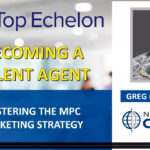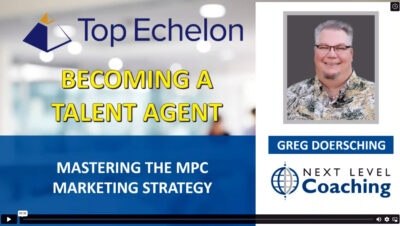The recruiting profession is not as light and frothy as it was, in say 2022. While adeptness in talent acquisition is undeniably crucial, it’s the art of cultivating client relationships, expanding clientele, and driving revenue growth that truly sets top recruiters apart. In other words . . . business development!
In this comprehensive blog post, we’ll examine an array of strategies and techniques meticulously crafted for agency recruiters aiming to elevate their business development endeavors to unprecedented heights.
Business Development in an Evolving Landscape
Agency recruiting operates within a dynamic ecosystem, influenced by a multitude of factors ranging from technological innovations and economic fluctuations to shifting workforce dynamics and evolving client expectations. To navigate this ever-changing landscape effectively, recruiters must possess not only a keen understanding of current market trends but also the agility to adapt their strategies in response to emerging challenges and opportunities.
In recent years, the recruitment industry has witnessed a significant paradigm shift driven by technological advancements and changing workforce demographics. The rise of artificial intelligence (AI), automation, and data analytics has revolutionized traditional recruiting processes, empowering recruiters with unprecedented insights and efficiencies. At the same time, a growing emphasis on diversity, equity, and inclusion (DEI) has reshaped talent acquisition strategies, prompting recruiters to adopt more inclusive and equitable practices.
Moreover, the global COVID-19 pandemic has accelerated digital transformation initiatives across industries, prompting recruiters to embrace remote work models, virtual recruiting technologies, and online collaboration tools. As the boundaries between work and life blur, recruiters must adapt their business development strategies to accommodate the evolving needs and preferences of both clients and candidates.
1. Establishing a Compelling Brand Identity
At the heart of effective business development lies a compelling brand identity that resonates with your target audience. Your agency’s brand should encapsulate its unique value proposition, core values, and brand personality, serving as a beacon that attracts clients and candidates alike.
Begin by conducting a comprehensive brand audit to assess your agency’s current positioning and identify areas for improvement. Define your brand’s narrative, articulating the story behind your agency’s inception, mission, and vision. Craft a compelling brand message that communicates your agency’s value proposition succinctly and persuasively.
Next, focus on visual branding elements such as logo design, color palette, typography, and imagery. These visual elements should align with your brand’s personality and resonate with your target audience. Invest in professional branding collateral, including a visually appealing website, social media profiles, and marketing materials, to establish a cohesive brand identity across all touchpoints.
Furthermore, leverage storytelling as a powerful tool to humanize your brand and forge emotional connections with your audience. Share client success stories, employee testimonials, and industry insights to showcase your agency’s expertise and credibility. By consistently reinforcing your brand identity through compelling storytelling, you position your agency as a trusted partner and thought leader in the recruitment industry.
2. Precision Targeting through Marketing and Networking
In today’s hyper-connected world, generic marketing strategies are no longer sufficient to cut through the noise. To maximize the effectiveness of your business development efforts, adopt a precision targeting approach that focuses on reaching your ideal clients with tailored messaging and personalized outreach.
Start by conducting thorough market research to identify your target market segments based on criteria such as industry, company size, geographic location, and hiring needs. Develop detailed buyer personas that encapsulate the characteristics, pain points, and preferences of your target clients, allowing you to craft highly targeted marketing campaigns that resonate with their specific needs.
Once you’ve identified your target audience, leverage a multi-channel marketing approach to reach them effectively. Utilize digital marketing channels such as social media, email marketing, content marketing, and search engine optimization (SEO) to amplify your agency’s visibility and attract inbound leads. Create engaging and informative content that addresses your target audience’s pain points, challenges, and interests, positioning your agency as a valuable resource and thought leader in the recruitment space.
In addition to digital marketing, prioritize face-to-face networking opportunities to build authentic relationships with potential clients. Attend industry conferences, networking events, and trade shows to connect with decision-makers and influencers in your target industries. Take a proactive approach to networking by initiating conversations, exchanging contact information, and following up with personalized messages to nurture relationships over time.
Moreover, leverage the power of referral marketing by incentivizing satisfied clients and candidates to refer new business to your agency. Offer rewards, discounts, or other incentives to encourage referrals and amplify word-of-mouth marketing efforts. By cultivating a network of satisfied clients and brand advocates, you create a virtuous cycle of referral-based growth that fuels your business development efforts.
3. Embracing Technology for Efficiency and Insight
In an increasingly digitized world, technology serves as a powerful enabler of business development, providing recruiters with the tools and insights needed to streamline processes, optimize workflows, and drive strategic decision-making.
Invest in a robust applicant tracking system (ATS) to centralize candidate data, track interactions, and manage client relationships more effectively. Choose an ATS that offers advanced features such as resume parsing, candidate scoring, and automated workflow automation to streamline recruitment processes and enhance productivity.
Furthermore, leverage recruitment CRM software to track client interactions, manage sales pipelines, and identify opportunities for upselling and cross-selling. Integrate your ATS with your CRM system to synchronize candidate and client data seamlessly, enabling more informed decision-making and personalized communication.
In addition to internal tools, leverage external technologies such as data analytics platforms, predictive analytics tools, and AI-powered recruitment solutions to gain deeper insights into market trends, candidate behavior, and competitive dynamics. Harness the power of data-driven decision-making to identify emerging opportunities, mitigate risks, and optimize your business development strategies for maximum impact.
Moreover, embrace automation technologies to streamline repetitive tasks, such as candidate sourcing, resume screening, and interview scheduling. By automating time-consuming processes, you free up valuable time and resources to focus on high-value activities such as client engagement, relationship-building, and strategic planning.
4. Offering Value-added Services to Differentiate
In a crowded marketplace, differentiation is essential for standing out from the competition and capturing the attention of prospective clients. Beyond traditional recruiting services, consider offering value-added solutions that address your clients’ broader talent management needs and add tangible value to their organizations.
One way to differentiate your agency is by offering specialized expertise in niche industries or hard-to-fill roles. Develop deep domain knowledge and industry insights that set you apart as a trusted advisor and subject matter expert in your field. By positioning yourself as a go-to resource for specialized talent, you attract clients seeking expertise and insights that can’t be found elsewhere.
Moreover, consider offering complementary services such as talent assessments, workforce planning consultations, or customized training programs to help clients optimize their talent acquisition and retention strategies. Conduct thorough needs assessments to identify gaps and opportunities within your clients’ organizations, then tailor your offerings to address their specific challenges and objectives.
Furthermore, prioritize the delivery of exceptional customer service and client satisfaction throughout the recruitment process. Take a proactive approach to client communication, providing regular updates, soliciting feedback, and addressing any concerns or issues promptly. By demonstrating your commitment to client success and satisfaction, you build trust and credibility that set the foundation for long-lasting relationships and repeat business.
5. Cultivating Authentic Client Relationships
At the heart of successful business development lies the ability to cultivate authentic, mutually beneficial relationships with clients based on trust, transparency, and mutual respect. Take a proactive approach to client engagement, seeking to understand your clients’ goals, challenges, and priorities on a deeper level.
Start by conducting thorough discovery meetings with clients to uncover their hiring needs, organizational culture, and business objectives. Ask probing questions to gain insights into their pain points, challenges, and expectations, then tailor your recruitment solutions accordingly. By demonstrating a genuine interest in your clients’ success and well-being, you position yourself as a trusted advisor and strategic partner rather than a transactional service provider.
Moreover, prioritize transparency and open communication throughout the client relationship lifecycle. Keep clients informed of progress, milestones, and potential roadblocks at every stage of the recruitment process. Be upfront about any challenges or limitations, and work collaboratively with clients to develop creative solutions and overcome obstacles together.
In addition to proactive communication, focus on delivering exceptional customer service and exceeding client expectations at every touchpoint. Anticipate clients’ needs and go above and beyond to provide value-added services, personalized recommendations, and timely support. By consistently delivering outstanding experiences, you foster client loyalty and advocacy that drive repeat business and referrals.
6. Harnessing the Power of Referrals
Word-of-mouth referrals remain one of the most powerful and cost-effective methods of generating new business for agency recruiters. Cultivate strong relationships with satisfied clients, candidates, and industry partners, and actively encourage them to refer new business to your agency.
To maximize the impact of your referral marketing efforts, implement a formalized referral program with clear incentives and rewards for referrers. Offer discounts, bonuses, or other incentives to clients and candidates who refer qualified leads to your agency, incentivizing them to actively promote your services to their networks.
Furthermore, make it easy for clients and candidates to refer business to your agency by providing clear instructions and streamlined processes for submitting referrals. Consider implementing a referral portal on your website or a dedicated email address for receiving referrals, making it convenient for referrers to submit leads with minimal friction.
Moreover, leverage the power of social proof and testimonials to amplify your referral marketing efforts. Showcase success stories, client testimonials, and case studies that highlight the positive outcomes and results achieved through your recruitment services. By leveraging social proof, you instill confidence in prospective clients and incentivize them to engage with your agency.
In addition to external referrals, cultivate a culture of internal referrals within your agency by incentivizing recruiters to refer qualified leads to their colleagues. Offer rewards or recognition for successful referrals, fostering a collaborative and team-oriented environment that encourages knowledge sharing and collaboration.
7. Committing to Continuous Learning and Adaptation
In the rapidly evolving landscape of agency recruiting, adaptability and continuous learning are essential for staying ahead of the curve and driving sustained growth. As new technologies emerge, market trends shift, and client expectations evolve, recruiters must remain agile and proactive in their approach to business development.
Make a commitment to lifelong learning and professional development by investing in training programs, workshops, and certifications that enhance your skills and expertise. Stay abreast of industry trends, best practices, and emerging technologies by attending conferences, webinars, and networking events within the recruitment community.
Moreover, foster a culture of experimentation and innovation within your agency, encouraging recruiters to test new strategies, tools, and techniques to identify what works best for your business. Embrace a growth mindset that values feedback, iteration, and continuous improvement, empowering your team to adapt and evolve in response to changing market dynamics.
Furthermore, prioritize data-driven decision-making by leveraging analytics tools and metrics to track the performance of your business development efforts. Establish key performance indicators (KPIs) such as client acquisition rates, revenue growth, and client satisfaction scores to measure the effectiveness of your strategies and identify areas for improvement.
Regularly analyze and review your business development metrics to identify trends, patterns, and opportunities for optimization. Use data to inform your strategic decision-making, identify areas of inefficiency or underperformance, and allocate resources effectively to maximize ROI.
8. Leveraging Data for Informed Decision-making
In today’s data-driven world, recruiters have access to a wealth of information and insights that can inform strategic decision-making and drive business growth. By leveraging data analytics tools and metrics, recruiters can gain deeper insights into market trends, candidate behavior, and competitive dynamics, enabling them to make more informed and strategic decisions.
Start by identifying the key performance indicators (KPIs) that are most relevant to your business development goals and objectives. These may include metrics such as client acquisition rates, revenue growth, client satisfaction scores, candidate conversion rates, and time-to-fill. By tracking these KPIs over time, recruiters can monitor the effectiveness of their business development efforts and identify areas for improvement.
Moreover, leverage data analytics tools and platforms to analyze and interpret your recruitment data, uncovering valuable insights and trends that can inform strategic decision-making. Look for patterns, correlations, and outliers within your data that may indicate opportunities for optimization or areas of inefficiency.
For example, analyze historical data to identify which marketing channels or networking events have generated the highest quality leads and conversions for your agency. Use this information to refine your marketing and networking strategies, reallocating resources to channels that yield the highest ROI.
Furthermore, leverage predictive analytics models to forecast future trends and outcomes, enabling recruiters to proactively identify potential challenges or opportunities before they arise. By harnessing the power of data-driven decision-making, recruiters can optimize their business development strategies, mitigate risks, and drive sustained growth and profitability.
Business Development: The Lifeblood of Recruiting
Effective business development is the lifeblood of agency recruiting, driving growth, and success in a competitive marketplace. By embracing a strategic approach, leveraging technology, and prioritizing client relationships, recruiters can unlock new opportunities, expand their clientele, and achieve their business goals.
However, success in business development is not a one-time achievement—it requires ongoing effort, adaptation, and continuous improvement. By staying agile, proactive, and customer-centric, agency recruiters can thrive in an ever-changing marketplace and build a foundation for long-term success. Remember that business development is a journey, not a destination, and success is measured not by where you are today, but by the progress you make tomorrow and beyond.









